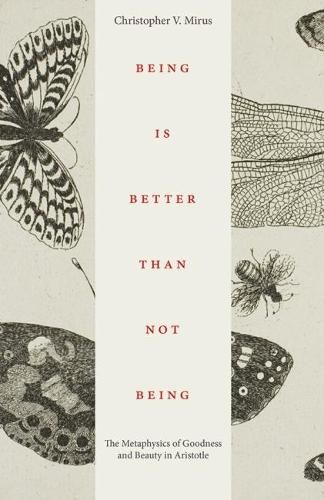Readings Newsletter
Become a Readings Member to make your shopping experience even easier.
Sign in or sign up for free!
You’re not far away from qualifying for FREE standard shipping within Australia
You’ve qualified for FREE standard shipping within Australia
The cart is loading…






In his contemplative works on nature, Aristotle twice appeals to the general principle that being is better than not being. Taking his cue from this claim, Christopher V. Mirus offers an extended, systematic account of how Aristotle understands being itself to be good.
Mirus begins with the human, examining Aristotle’s well-known claim that the end of a human life is the good of the human substance as such-which turns out to be the good of the human capacity for thought. Human thought, however, is not concerned with human affairs alone. It is also contemplative, and contemplation is oriented toward the beauty of its objects. In each of the three branches of contemplative thought-mathematics, natural science, and theology-the intelligibility of being renders it beautiful to thought. Both in nature and in human life, moreover, the being that is beautiful through its intelligibility serves also as an end of motion and of action; hence it counts not only as beautiful (kalon), but also as good (agathon).
The persistent concern of thought with the beautiful reveals what is at stake for human beings in Aristotle’s larger metaphysics of the good: in the connection between goodness and actuality that structures his natural science and metaphysics, in his explicit claim that being is better than not being, and in his concepts of order and determinacy, which help connect being with goodness. These in turn shed light on his concepts of the complete and the self-sufficient, on his teleological understanding of the four elements, and on the curious role of the honorable in his natural science and metaphysics.
$9.00 standard shipping within Australia
FREE standard shipping within Australia for orders over $100.00
Express & International shipping calculated at checkout
In his contemplative works on nature, Aristotle twice appeals to the general principle that being is better than not being. Taking his cue from this claim, Christopher V. Mirus offers an extended, systematic account of how Aristotle understands being itself to be good.
Mirus begins with the human, examining Aristotle’s well-known claim that the end of a human life is the good of the human substance as such-which turns out to be the good of the human capacity for thought. Human thought, however, is not concerned with human affairs alone. It is also contemplative, and contemplation is oriented toward the beauty of its objects. In each of the three branches of contemplative thought-mathematics, natural science, and theology-the intelligibility of being renders it beautiful to thought. Both in nature and in human life, moreover, the being that is beautiful through its intelligibility serves also as an end of motion and of action; hence it counts not only as beautiful (kalon), but also as good (agathon).
The persistent concern of thought with the beautiful reveals what is at stake for human beings in Aristotle’s larger metaphysics of the good: in the connection between goodness and actuality that structures his natural science and metaphysics, in his explicit claim that being is better than not being, and in his concepts of order and determinacy, which help connect being with goodness. These in turn shed light on his concepts of the complete and the self-sufficient, on his teleological understanding of the four elements, and on the curious role of the honorable in his natural science and metaphysics.